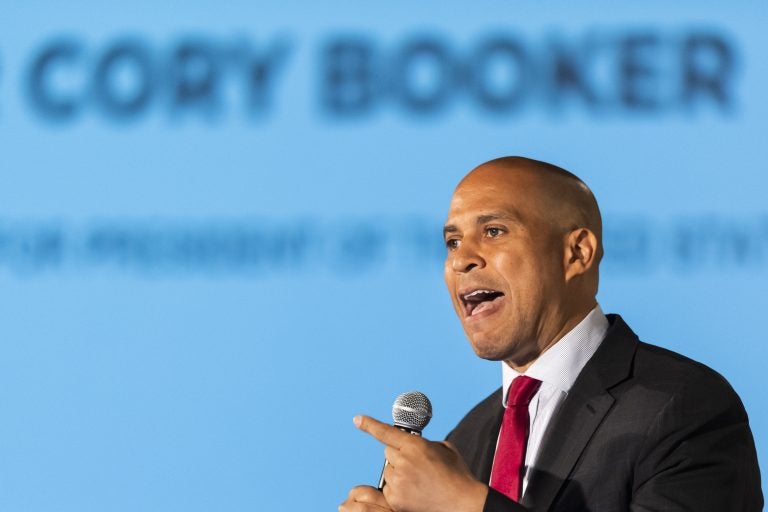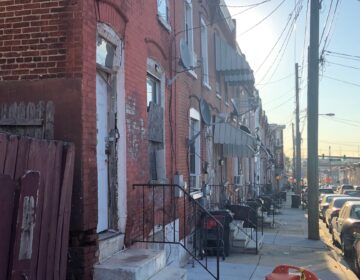Booker’s affordable housing plan features tax credit for renters
Saying America has a “housing affordability crisis,” Booker’s proposal also seeks to end restrictive zoning laws that keep low-cost housing out of many communities.

Democratic presidential candidate Sen. Cory Booker, of New Jersey, speaks during the African American Leadership Council Summit, Thursday, June 6, 2019, in Atlanta. (John Amis/AP Photo)
Drawing at least in part on lessons from his home state of New Jersey, U.S. Sen. Cory Booker has unveiled a multi-pronged national plan, centered on a renters’ tax credit, for making housing more affordable, as part of his campaign for the Democratic nomination for president.
Saying America has a “housing affordability crisis,” Booker’s proposal also seeks to end restrictive zoning laws that keep low-cost housing out of many communities across the country, provide funds to build more affordable homes, help tenants fight eviction proceedings and eliminate housing discrimination and homelessness. Several of the provisions are part of the Housing, Opportunity, Mobility and Equality Act Booker introduced in the Senate last August.
The centerpiece of his proposal would be a refundable credit for those spending more than 30 percent of their pre-tax income on rent. The credit would cover the difference between 30 percent of an individual’s income and housing expenses, capped at the neighborhood fair-market value as enumerated by the federal Department of Housing and Urban Development. There would be no income cap, so the credit would help more than just those with low incomes.
The ambitious plan comes with a high price tag — $134 billion a year just for the renters’ credit, according to a campaign source. Booker was confident about being able to pay for his proposal, though less detailed about how, writing in a post on Medium, “This plan is fully paid for, funded by simply restoring 2009-era estate-tax rules and closing loopholes that allow wealthy households to avoid paying taxes on investments held at death.” In other words, rolling back the most regressive parts of Trump’s tax changes.
Assisting renters is only fair, Booker wrote, given the United States spends “$201 billion each year through the tax code subsidizing homeownership, overwhelmingly benefiting wealthy families.”
Many NJ renters are ‘cost burdened’
The plan notes that almost half of the nation’s more than 43 million renters spend in excess of 30 percent of their income on rent. The National Low Income Housing Center ranks New Jersey as the sixth most expensive state in the nation, with 36 percent of all households renting and a typical two-bedroom costing $1,465 a month. Data from the U.S. Census Bureau shows essentially half of all renters in New Jersey are cost-burdened, meaning they spend more than 30 percent of their income on housing.
The campaign gave an example of how the credit would impact an individual: Someone earning a minimum wage of $15,080 per year and paying $890 per month for a studio apartment in Newark would receive a credit of $513 per month, or $6,156 for the year, effectively boosting their pre-tax income by 40 percent.
A chart put out by the campaign shows that New Jerseyans would get the third highest median credit in the nation — $6,200 — behind only California and Hawaii. Almost 1.8 million individuals would benefit in the Garden State and 57 million across the country, with a national median credit of $4,800 a year.
“Access to safe, affordable housing can be transformative in the trajectory of people’s lives,” Booker said in a statement. “Making sure all Americans have the right to good housing is very personal to me. I’m determined to tear down the barriers that stand in the way of every American being able to do for their families what my parents did for mine.”
Booker has often told the story of how his parents faced discrimination when they moved to suburban Harrington Park. He later chose to live to Newark — where he would eventually become mayor — and represented tenants in their fights with “slumlords.”
‘Seed capital’ to buy a home
Included as part of the plan is the Baby Bonds program Booker already proposed. This would be a federally-funded savings account created for every child at birth with $1,000 and that could grow by up to $2,000 every year until the child turns 18, depending on family income. By age 18, low-income account-holders would have access to nearly $50,000 in “seed capital” that could help them buy a home. An analysis by his staff found that at age 30, 45 percent of account holders would have enough money to put a 20-percent down payment on a starter home priced at the national median.
Booker’s proposal also seeks to attack exclusionary zoning, a problem with which New Jersey has been struggling since the Mount Laurel fair-housing court cases more than four decades ago. He cited a HUD publication that estimated restrictive land-use rules lowered access to affordable homes by more than 50 percent between 1964 and 2009. New Jersey’s Supreme Court has ruled that all municipalities in the state must provide for their fair share of regional affordable housing needs and a judge last year calculated the state’s need at 155,000 units. Close to 300 communities have drafted or are in the process of drafting plans that include the number of low-cost homes they have agreed is their fair share.
The senator plans to use incentives to get communities across the state to eliminate restrictive zoning rules. He proposes requiring that more than $16 billion in annual funding for transportation, infrastructure and other programs be distributed based on how much progress they make in allowing affordable-home development, which could include reducing restrictions on lot sizes, allowing accessory apartments and other means. Booker also wants to increase funding for municipalities that make significant strides.
New Jersey housing advocates applauded Booker’s plan.
“It’s an incredibly ambitious plan,” said Phyllis Salowe-Kaye, executive director of New Jersey Citizen Action. “It speaks clearly to the needs of people not only in New Jersey, but across the country.”
She said the renter’s credit is especially important in helping people who have to pay “much more rent than they should” due to high housing costs and a dearth of affordable apartments.
“We’re happy that Senator Booker is raising the profile of fair housing on the national stage,” said Kevin Walsh, director of the Fair Share Housing Center that is working to get municipalities to agree to local affordable-housing obligations. “His plan builds off the successes of the Mount Laurel doctrine here in New Jersey and acknowledges the systemic racism that still undergirds our housing system and that excludes working families and people of color from too many of our towns across the country.”
Other aspects of Booker’s plan
Other key proposals in his plan include:
- Fully funding the federal Housing Trust fund with $40 billion each year to build, rehabilitate and operate rental housing for low-income individuals;
- Creating a national Eviction Right to Counsel Fund to provide money to states and communities that give low-income tenants facing eviction the right to representation;
- Amending the Fair Housing Act to outlaw discrimination based on sexual orientation or gender identity and putting protections in place to make it easier for individuals with housing vouchers and arrest records to get housing;
- Restoring protections eliminated by the Trump administration, starting with the Affirmatively Furthering Fair Housing Rule, which required communities to undo historic patterns of segregation and discrimination and to advance inclusivity;
- Ending tenant blacklisting by enacting legislation similar to the Tenant Protection Act he sponsored that would prevent consumer-reporting agencies from using information from eviction courts against tenants if they won their cases.
Booker’s plan appears to be the most comprehensive released thus far by a Democratic candidate for president, but he is not alone in making an issue out of housing. Sens. Elizabeth Warren of Massachusetts and Kamala Harris of California also have introduced bills into the Senate to help renters or homebuyers and are pushing for those programs on the campaign trail. Whether Booker or anyone else would able to sign such programs into law if elected president is another question that would depend upon the makeup of Congress and the fiscal health of the federal budget.
WHYY is your source for fact-based, in-depth journalism and information. As a nonprofit organization, we rely on financial support from readers like you. Please give today.




